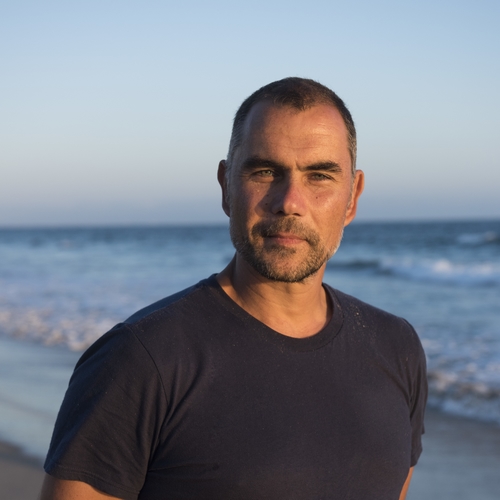
Mariia Novoselia
Staff writer
In order to solve the problem of ocean plastics, Marcus Eriksen, co-founder of the 5 Gyres Institute, combines science, education and advocacy.
“If we look at the downstream impacts (of plastics) on the environment and on people, then we could turn around and look upstream and see: ‘What are we doing wrong? What can we do better?’ That’s where we go all the way to production and the choices of the kind of chemistry that (goes) into products and packaging, as well as the kind of products that we’re making.” Eriksen said. “It makes no sense to make a product that you will throw away that’s made from a material that will last forever.”
Titled “Combating Ocean Plastics,” Eriksen’s Chautauqua Climate Change Initiative lecture is at 2 p.m. today in Smith Wilkes Hall. In the talk, he said he will discuss the lifecycle of plastic, the harm it causes and current remediation efforts.
The lecture, Eriksen said, will constitute his first visit to Chautauqua Institution.
“Going to Chautauqua is a chance to meet new people, have good conversations and see what more I can learn at the same time. Are there any issues of plastic pollution there that we can address together? I can offer some insights on what works elsewhere in the world, and I can see what people are doing there that’s very good and can be shared elsewhere,” he said.
Eriksen has been studying plastics for over 20 years, publishing more than 40 pieces of research. Nevertheless, career paths, he said, are not always straightforward.
Growing up “in a very strong conservation ethic” in Louisiana, Eriksen said he has always been fascinated by wildlife. He was working at the zoo in New Orleans before he finished his doctoral degree and decided to raft the Mississippi River.
From Lake Itasca in Minnesota to the Gulf of Mexico, Eriksen said he spent around six months rafting more than 2,000 miles on a pontoon boat made of plastic bottles.
“What I saw was an endless trail of plastic trash, and it struck me as extremely problematic and wrong that we allow all of our trash to harm wildlife, to harm the environment (and) to harm people,” he said.
The journey, Eriksen got him involved in the issue of plastic pollution. Five years later, he built a much bigger raft and sailed from California to Hawaii, which was documented in the short film “Junk Raft,” being screened at 5 p.m. tonight at Chautauqua Cinema.
Rafting down to the Gulf of Mexico also led Eriksen to co-found the 5 Gyres Institute.
Gyres, he said, are natural circulation patterns that rotate clockwise in the Northern hemisphere and counterclockwise in the Southern hemisphere.
“A plastic bottle leaving California will get to Japan in five or six years and come back to the (United States) in five more years,” Eriksen said. “The same thing happens in the Northern Atlantic (Ocean) – some trash entering the Mississippi River goes to the Gulf of Mexico; the Gulf Stream will take it around Florida, up the coast to Bermuda and across the Azores down to closer Africa and across to the Caribbean again.”
There are five subtropical gyres in the world, and that’s where, Eriksen said, everything that is thrown in the ocean accumulates.
When he first started this work about 14 years ago, the questions Eriksen and his team were trying to answer revolved around the amount, location and impact of plastics in the ocean, he said. Since then, due to how much information has been uncovered – “there’s more science published in the last five years than the previous 50” – the organization has shifted its focus to accelerating the changes to help the environment, Eriksen said.
The 5 Gyres Institute, he said, works with companies that “usher in alternatives that work,” such as new biomaterials to replace plastic items.
The mission of the 5 Gyres Institute is to “(empower) action against the global health crisis of plastic pollution through science, education and advocacy,” according to the organization’s website.
The three aspects, Eriksen said, are not mutually exclusive and complement one another. First, science gives the organization real facts to work with, he said.
“If you are not working with good information, good science (and) good facts, then you can potentially lose time and money going in the wrong direction,” Eriksen said.
Then, he said, 5 Gyres shares the knowledge with a broader community through research publications, educational programs and traveling exhibitions. The organization’s online “Trash Academy” provides weekly YouTube videos on multiple facets of pollution including cigarette butts, personal hygiene and fishing gear.
The knowledge, Eriksen said, can then be used for advocacy – “to get bills passed, to see cities restrict single-use plastics, to see laws in the books that put limits on the kind of products that can be made from plastics” and so on.
“The honest broker is one that has public good advice and brings good science to policy issues,” Eriksen said.
At Chautauqua, Eriksen said he hopes to be “a catalyst for some local change.” While the problem of plastic pollution is big, the solutions, he said, are clear.
“Whether you’re a small town, a small institution, a big state or an entire country, getting organized in small actions together allows us to fix the problem,” he said.




